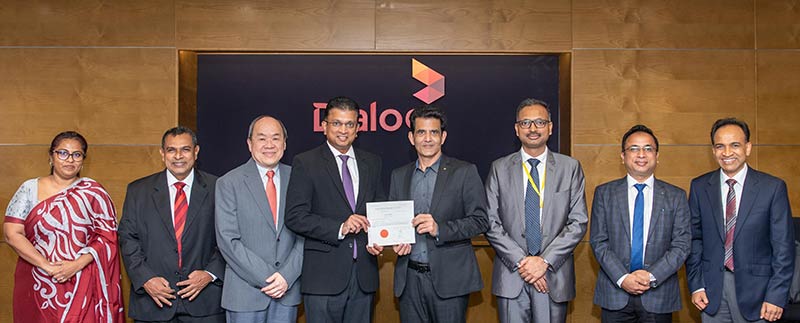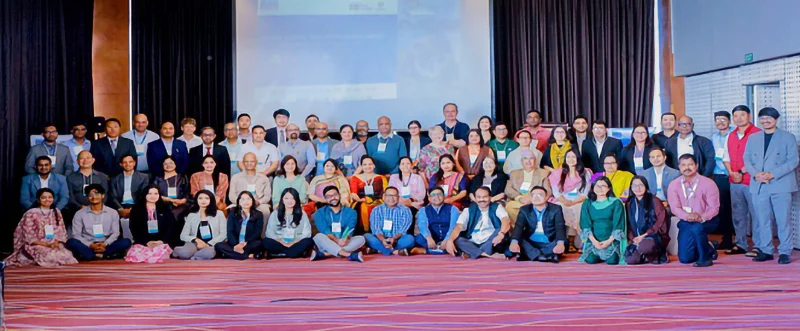Business
Dialog Axiata completes acquisition of Airtel Lanka and initiates amalgamation

Dialog Axiata PLC (“Dialog”), Axiata Group Berhad (“Axiata”), and Bharti Airtel Limited (“Bharti Airtel”) (collectively “the Parties”) successfully completed the share sale transaction, with Dialog acquiring 100% of the issued shares in Bharti Airtel Lanka (Private) Limited (“Airtel Lanka”) through a share swap. Post this share swap, Axiata holds 73.75% of Dialog while Bharti Airtel will own 10.355% and the remaining 15.895% of shares are held by the public. Dialog aims to amalgamate Airtel Lanka under the applicable provisions of the Companies Act, with Dialog remaining as the amalgamated entity.
This consolidation, first announced in May 2023, represents a significant milestone in the telecommunications industry in Sri Lanka, bringing together the strengths and expertise of two leading companies, poised to deliver a world-class digital telco experience that will contribute significantly to the growth of the country’s digital ecosystem and economy.
Post-merger, Dialog and Airtel brands will continue to serve their respective customers, while the two networks will begin consolidation aimed at delivering exceptional value and superior connectivity solutions to consumers and enterprises.
“This milestone marks the conclusion of the acquisition of Airtel Lanka, and we warmly welcome the Airtel team and all 3 million subscribers on the Airtel network to the Dialog family. We extend our heartfelt gratitude to the Government of Sri Lanka, the Telecommunications Regulatory Commission (TRC), the Board of Investment (BOI), the Colombo Stock Exchange (CSE), the Central Bank of Sri Lanka (CBSL), Axiata and Bharti Airtel teams and all other stakeholders for their invaluable support in bringing this transaction to fruition,” said Supun Weerasinghe, Chief Executive of Dialog Axiata PLC.
“As we embark on this transformative journey, our focus will be on leveraging the combined strengths of Dialog and Airtel to pioneer advancements in Sri Lanka’s telecommunications sector. This merger positions us to drive substantial growth, not just in customer experience and innovation, but also in contributing to the digital economy of Sri Lanka. This strategic move underscores our commitment to setting new benchmarks in connectivity and empowering businesses and individuals alike to thrive in an increasingly digital world.” he further added. (Dialog)
Business
Rs. 1 million fine proposed on substandard plastic producers

The government’s proposal to raise fines on manufacturers of substandard plastic products to as much as Rs. 1 million is expected to trigger a major compliance shift within Sri Lanka’s plastics industry, correcting long-standing market distortions caused by weak enforcement.
Environment Deputy Minister Anton Jayakody said the move targets producers who continue to bypass approved standards, undercutting compliant manufacturers and exacerbating environmental damage.
Environment Ministry Advisor Dr. Ravindra Kariyawasam said the initiative represents a structural market correction rather than a purely environmental intervention.
“Non-compliant producers have enjoyed an artificial cost advantage for years, distorting pricing and discouraging legitimate investment,” Kariyawasam told The Island Financial Review. “Meaningful penalties are essential to restore fairness and industry discipline.”
He said the widespread circulation of low-grade plastic products has eroded consumer confidence and delayed the sector’s transition towards higher-value and sustainable manufacturing.
Industry analysts note that a Rs. 1 million fine would significantly alter risk calculations for marginal operators, forcing upgrades in machinery, testing and compliance or pushing weaker players out of the market.
Kariyawasam stressed that the policy is intended to support responsible businesses rather than suppress industry growth.
“Manufacturers investing in recycling, biodegradable alternatives and quality assurance should not be penalised by competing with environmentally damaging, low-cost products,” he said.
The Deputy Minister indicated that tighter enforcement will be paired with policy support for sustainable packaging and circular-economy initiatives, aligning the sector with emerging global trade and environmental standards.
From a business perspective, the proposed regulation is likely to impact pricing, supply chains and capital investment decisions, while improving the long-term credibility of Sri Lanka’s plastics industry in both domestic and export markets.
By Ifham Nizam
Business
First Capital to unveil Sri Lanka’s Economic Outlook and Investment Strategies for 2026

First Capital Holdings PLC (the Group), a subsidiary of JXG (Janashakthi Group) and a pioneering force in Sri Lanka’s investment landscape, is set to host the 12th edition of its renowned ‘First Capital Investor Symposium’ on 22 January 2026 at Cinnamon Life Colombo, starting from 5.30 pm onwards.
The 12th Edition will focus on Sri Lanka’s Economic Outlook for 2026, offering attendees a comprehensive analysis of market forecasts, investment strategies and emerging opportunities in the capital markets. The symposium serves as a crucial gathering for investors seeking insights to navigate the evolving economic landscape and make sound, strategic decisions.
As a leading investment institution, First Capital remains committed to promoting informed decision-making through comprehensive research and market analysis. By hosting this annual symposium, the organisation reinforces its role as a trusted partner in Sri Lanka’s capital markets, providing a premier platform for investors, professionals, and industry leaders to exchange knowledge, explore opportunities and build meaningful connections.
A key highlight of this year’s agenda will be First Capital’s presentation on the Economic and Investment Outlook, outlining market conditions and investment strategies for the period ahead. The presentation will be delivered by Ranjan Ranatunga, Assistant Vice President – Research of First Capital Holdings PLC.
Business
Rivers, Rights, Resilience Forum 2026 begins in Colombo

Oxfam in Asia commenced the Rivers, Rights, Resilience Forum (RRRF) 2026, a three-day regional forum bringing together water experts, policymakers, civil society, researchers, and community leaders from across South Asia and beyond to strengthen cooperation on shared river systems and climate resilience.
The Forum is part of the Transboundary Rivers of South Asia (TROSA) programme, supported by the Government of Sweden, which works on the Ganges–Brahmaputra–Meghna (GBM) river basins, while also encouraging cross-basin learning at the regional and global levels. This year’s theme is “Building Resilient Communities and Ecosystems.” The Forum is co-organised by Oxfam in Asia and Dev Pro, Sri Lanka.
The forum opened with a welcome address by John Samuel, Regional Director, Oxfam in Asia, who highlighted the deep connection between rivers, politics, climate change, and sustainability. He underlined how rivers shape both environmental and social outcomes across South Asia and called for stronger collaboration between governments and civil society.
“Today building resilience is important in terms of climate and politics, and when civic space is shrinking, we should all work in solidarity,” he said.
Speaking at the Forum, Chamindry Saparamadu, Executive Director of DevPro shared examples of how communities in Sri Lanka have taken actions to ensure equitable access to water resources through catchment protection initiatives, community-based water societies etc. She further highlighted that learning exchanges would be useful to further strengthen inter-provincial water governance in Sri Lanka.
The Chief Guest, Syeda Rizwana Hasan, Advisor, Ministry of Environment, Forest and Climate Change and Ministry of Water Resources, Bangladesh, in her video message, emphasised the need for regional cooperation among South Asian countries beyond the upstream–downstream identity.
“Climate change will make water scarce, so South Asian countries have to come together to work on the common interest of their communities. Rivers are not just ecology but economics as well for communities. Forums like this help us to share our experience and learn from each other,” she said.
-

 Editorial2 days ago
Editorial2 days agoIllusory rule of law
-

 News3 days ago
News3 days agoUNDP’s assessment confirms widespread economic fallout from Cyclone Ditwah
-

 Business5 days ago
Business5 days agoKoaloo.Fi and Stredge forge strategic partnership to offer businesses sustainable supply chain solutions
-

 Editorial3 days ago
Editorial3 days agoCrime and cops
-

 Features2 days ago
Features2 days agoDaydreams on a winter’s day
-

 Editorial4 days ago
Editorial4 days agoThe Chakka Clash
-

 Features2 days ago
Features2 days agoSurprise move of both the Minister and myself from Agriculture to Education
-

 Features1 day ago
Features1 day agoExtended mind thesis:A Buddhist perspective













